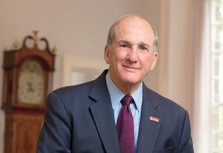Leadership & Governance
Rutgers’ distinctive history as a colonial college, a land-grant institution, and a state university helped shape its current governance structure.
Governing Boards
- The Board of Governors, created by state law in 1956, is the chief governing body of the university.
- The Board of Trustees, a governing body since the university’s founding in 1766, acts in an advisory capacity to the Board of Governors and has certain fiduciary responsibilities.
- Rutgers’ president implements board policies with the help and advice of senior administrators—including chancellors overseeing Rutgers University–New Brunswick, Rutgers University–Newark, Rutgers University–Camden, and Rutgers Biomedical and Health Sciences—and other members of the Rutgers community.
Additional Boards
- Other boards include a Rowan University/Rutgers University–Camden Board of Governors, which provides joint oversight for any new health sciences programs to be created by either institution or by the two institutions collaboratively, and a Camden Board of Directors, subject to the authority of the Board of Governors.
Faculty’s Role in Governance
Faculty play a major role in guiding university policy and procedures through shared governance with the boards and senior administration.
- Rutgers University Senate
- New Brunswick Faculty Council
- Rutgers Biomedical and Health Sciences Faculty Council
- Newark Faculty Council
- Camden Faculty of Arts and Sciences Senate
Resources
- Governing Boards of the University
- Board of Governors Membership Listing
- Board of Trustees Membership Listing
- Office of the President
- Office of the Secretary of the University
- Office of the Senior Vice President and General Counsel
- New Jersey Agricultural Experiment Station Board of Managers
- Rutgers University Foundation Board of Overseers
- University Administrative Council
- University Custodian of Records
- University Policy Library


